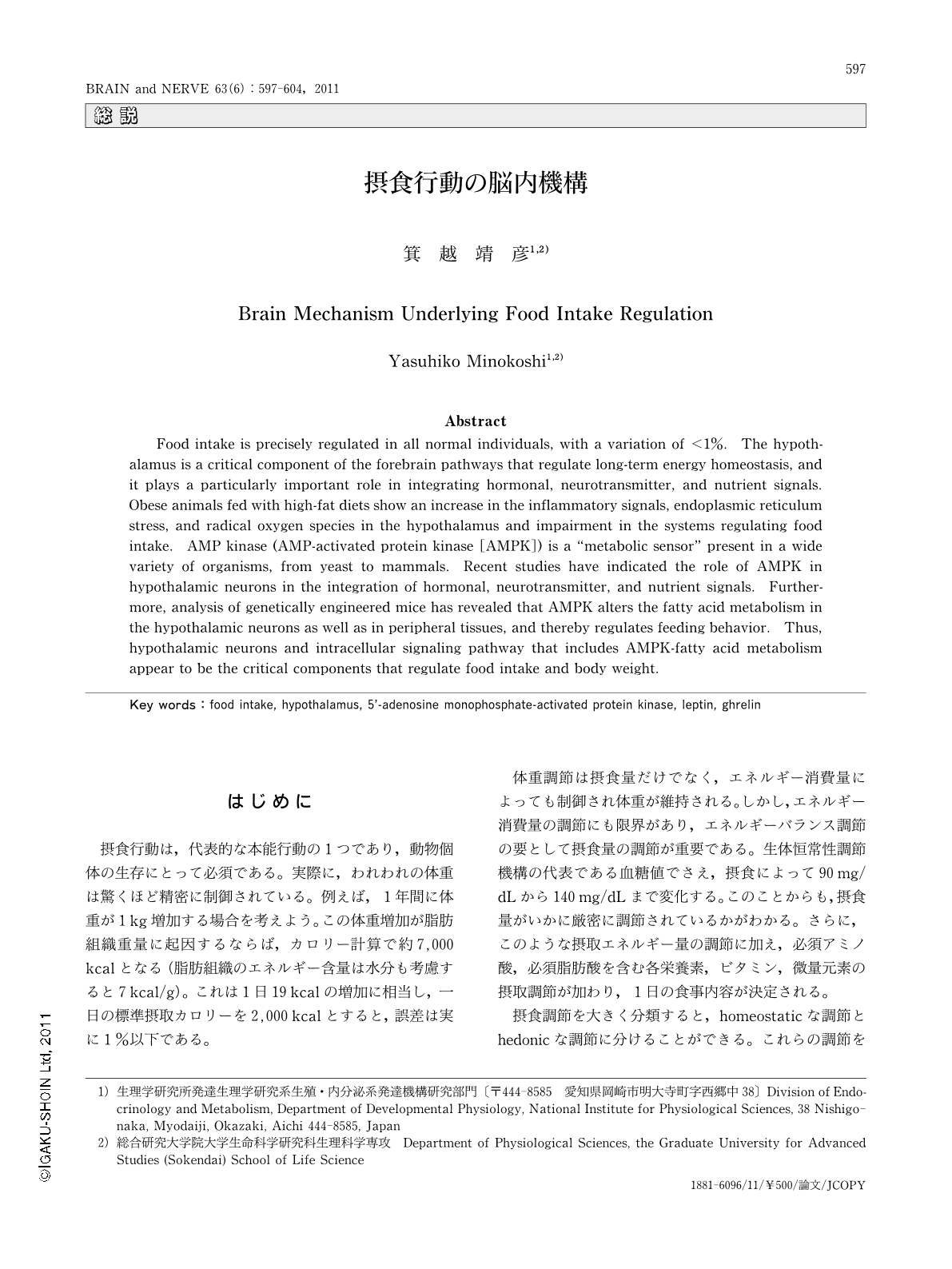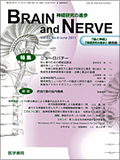Japanese
English
- 有料閲覧
- Abstract 文献概要
- 1ページ目 Look Inside
- 参考文献 Reference
はじめに
摂食行動は,代表的な本能行動の1つであり,動物個体の生存にとって必須である。実際に,われわれの体重は驚くほど精密に制御されている。例えば,1年間に体重が1kg増加する場合を考えよう。この体重増加が脂肪組織重量に起因するならば,カロリー計算で約7,000kcalとなる(脂肪組織のエネルギー含量は水分も考慮すると7kcal/g)。これは1日19kcalの増加に相当し,一日の標準摂取カロリーを2,000kcalとすると,誤差は実に1%以下である。
体重調節は摂食量だけでなく,エネルギー消費量によっても制御され体重が維持される。しかし,エネルギー消費量の調節にも限界があり,エネルギーバランス調節の要として摂食量の調節が重要である。生体恒常性調節機構の代表である血糖値でさえ,摂食によって90mg/dLから140mg/dLまで変化する。このことからも,摂食量がいかに厳密に調節されているかがわかる。さらに,このような摂取エネルギー量の調節に加え,必須アミノ酸,必須脂肪酸を含む各栄養素,ビタミン,微量元素の摂取調節が加わり,1日の食事内容が決定される。
摂食調節を大きく分類すると,homeostaticな調節とhedonicな調節に分けることができる。これらの調節を各脳領域にあてはめると,homeostaticな調節を視床下部と脳幹が,hedonicな調節を扁桃体などの大脳辺縁系,側坐核,前頭前野などが担当すると考えられる。この考え方は今でも大枠において妥当であり,われわれが“美味な”食事に対して過食になることはhedonicな調節によるところが大きい。しかし,たとえ一過性に過食となっても,われわれの体は長期的にみると摂取エネルギー量や各栄養素の摂取を厳密に制御しているので,その意味で視床下部および脳幹はとりわけ重要である。
視床下部での摂食調節機構に関する研究は,古くは破壊実験,電気生理学的な実験が中心であった。しかし,1994年にレプチン,1999年にグレリンが発見されて以後,視床下部,脳幹における摂食調節機構が生化学,内分泌学の分野においても議論されるようになった。さらに,肥満やメタボリックシンドロームのモデル動物において視床下部での摂食調節機構の異常が明らかにされ,視床下部の重要性が改めて浮き彫りとなった。
視床下部は,栄養素,ホルモン,あるいは感覚神経を通して生体のエネルギーレベルを感知し,摂食行動とエネルギー消費,代謝を調節する。視床下部は,ヒト脳では非常に小さな領域を占めるに過ぎないが,この脳領域にはグルコースや脂肪酸を感受する化学感受性ニューロンが存在し,かつレプチン受容体などホルモン受容体が豊富に発現する。視床下部では,これらの機構を用いてわれわれの体の栄養状態を常にモニターし,その情報をもとに摂食行動を調節している。
一方,近年の発見によって視床下部の一部のニューロンには肝臓や膵臓など末梢組織とよく似た代謝調節機構が存在し,これによって神経活動,遺伝子発現を変化させ,摂食量を調節することが,明らかとなった。そのため,肥満や糖尿病などさまざまな代謝疾患において,末梢組織と同様の異常が視床下部でも引き起こされ,そのことが過食,さらには視床下部を介した末梢組織への代謝調節作用を破綻させる可能性がある。
本総説では,このような視床下部における代謝調節機構と摂食調節との関係について,“metabolic sensor”として知られるAMPキナーゼ(5'-adenosine monophosphate-activated protein kinase:AMPK)を中心に概説する。
Abstract
Food intake is precisely regulated in all normal individuals,with a variation of <1%. The hypothalamus is a critical component of the forebrain pathways that regulate long-term energy homeostasis,and it plays a particularly important role in integrating hormonal,neurotransmitter,and nutrient signals. Obese animals fed with high-fat diets show an increase in the inflammatory signals,endoplasmic reticulum stress,and radical oxygen species in the hypothalamus and impairment in the systems regulating food intake. AMP kinase (AMP-activated protein kinase [AMPK]) is a "metabolic sensor" present in a wide variety of organisms,from yeast to mammals. Recent studies have indicated the role of AMPK in hypothalamic neurons in the integration of hormonal,neurotransmitter,and nutrient signals. Furthermore,analysis of genetically engineered mice has revealed that AMPK alters the fatty acid metabolism in the hypothalamic neurons as well as in peripheral tissues,and thereby regulates feeding behavior. Thus,hypothalamic neurons and intracellular signaling pathway that includes AMPK-fatty acid metabolism appear to be the critical components that regulate food intake and body weight.

Copyright © 2011, Igaku-Shoin Ltd. All rights reserved.


